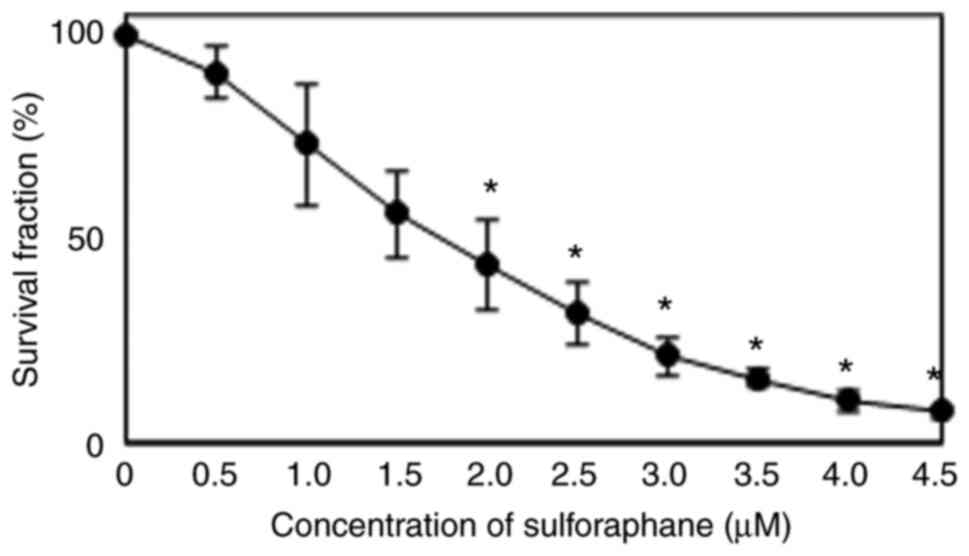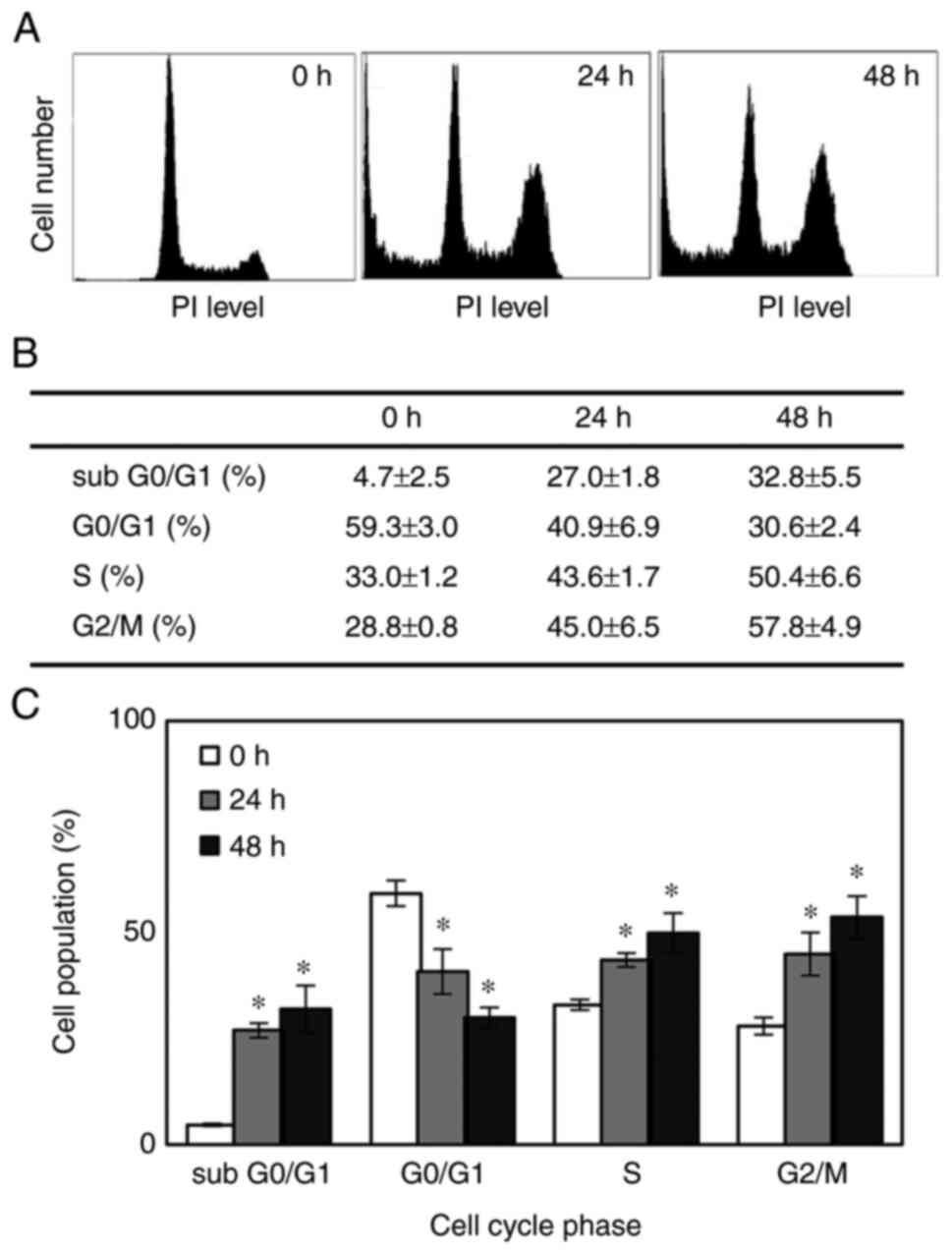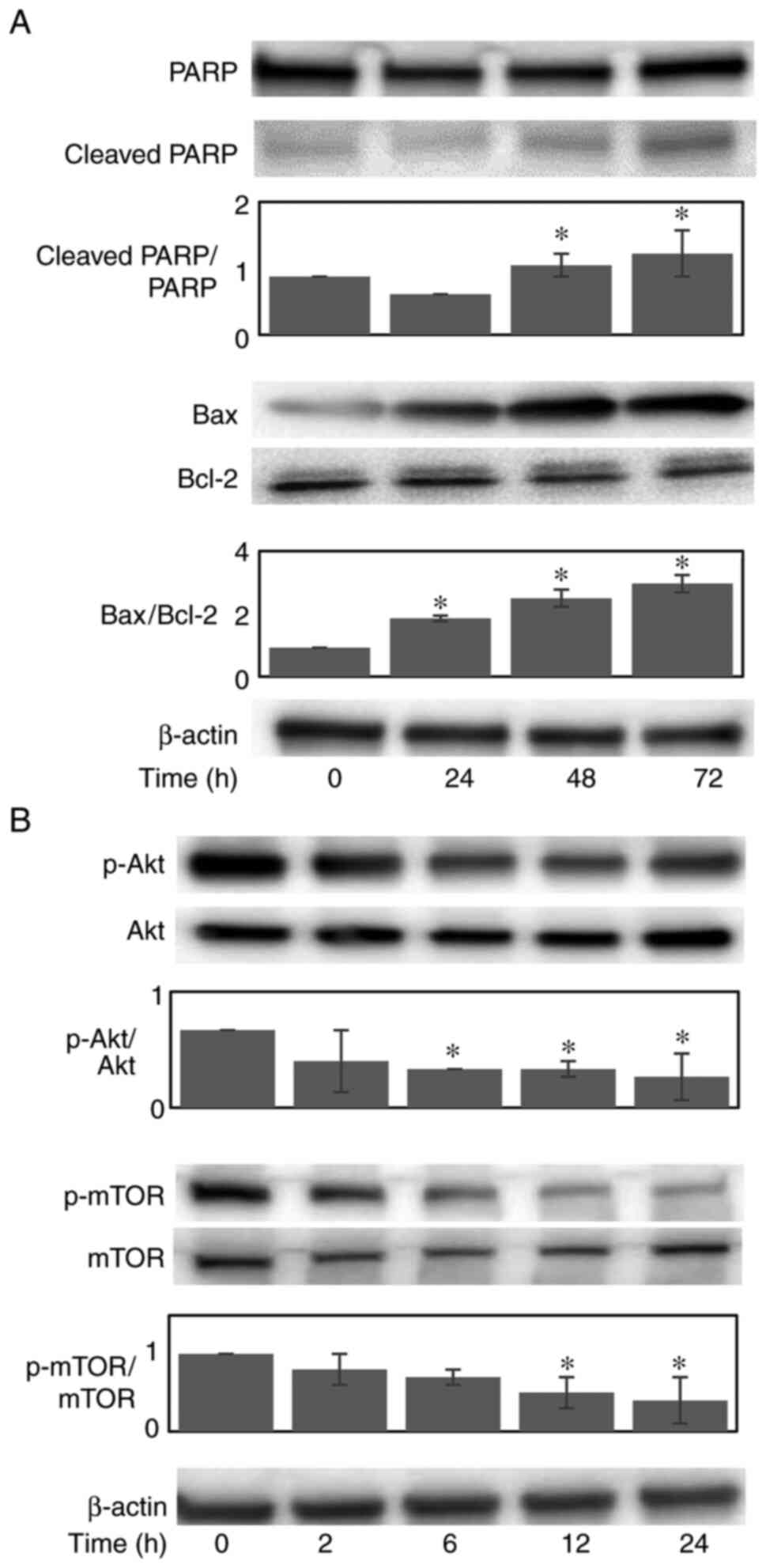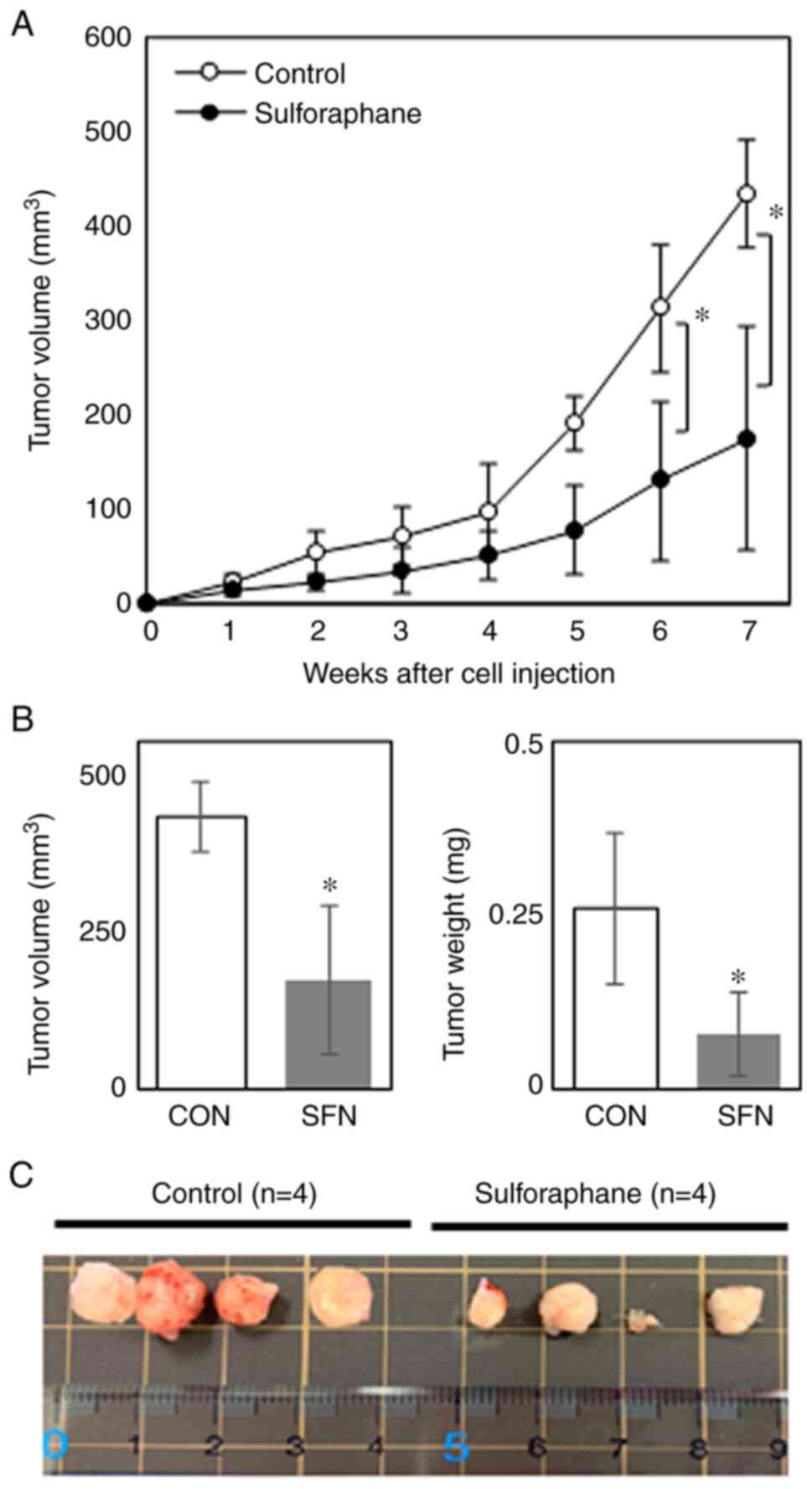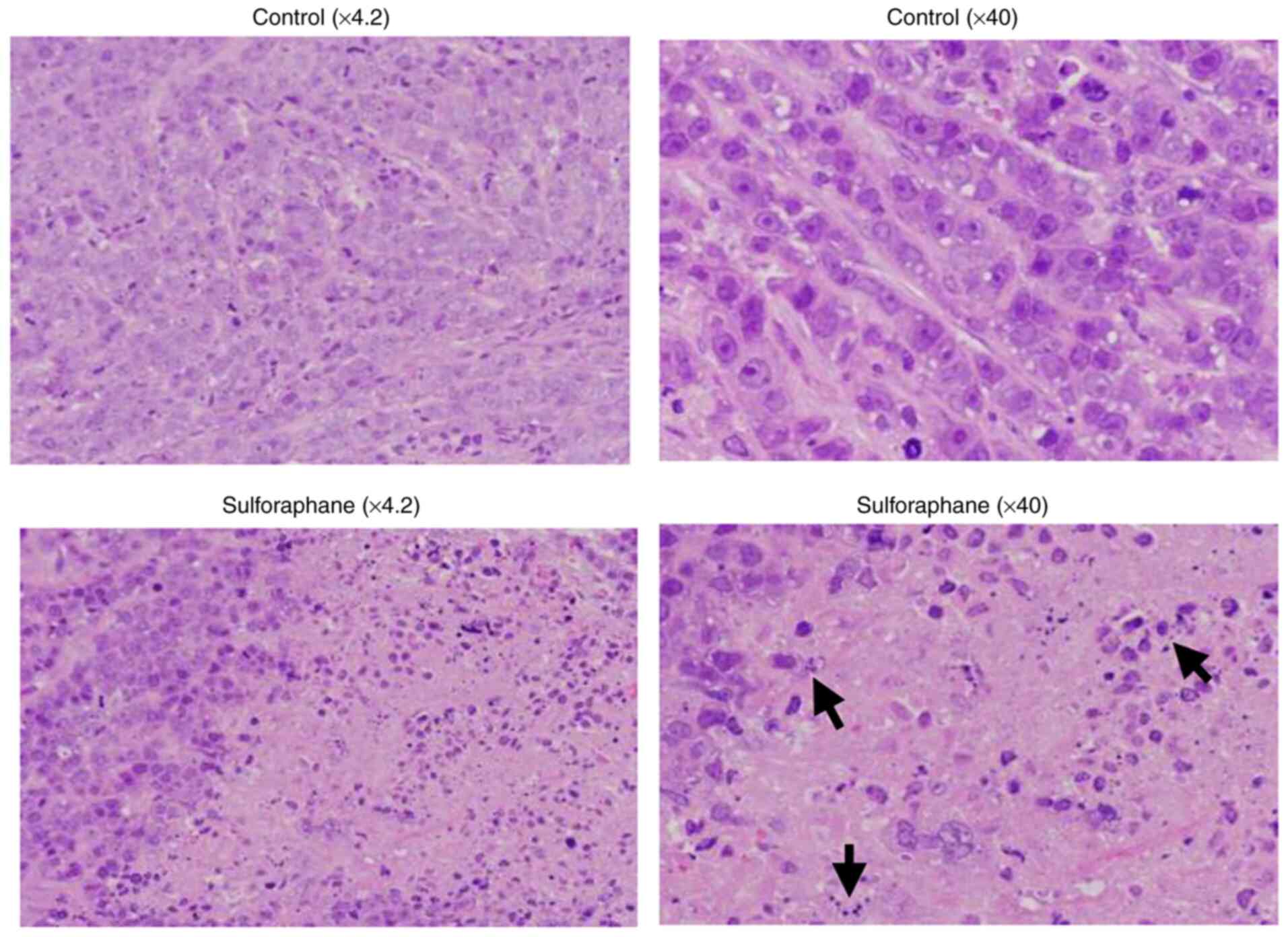|
1
|
Sung H, Ferlay J, Siegel RL, Laversanne M,
Soerjomataram I, Jemal A and Bray F: Global cancer statistics 2020:
GLOBOCAN estimates of incidence and mortality worldwide for 36
cancers in 185 countries. CA Cancer J Clin. 71:209–249.
2021.PubMed/NCBI View Article : Google Scholar
|
|
2
|
Kumar P and Aggarwal R: An overview of
triple-negative breast cancer. Arch Gynecol Obstet. 293:247–269.
2016.PubMed/NCBI View Article : Google Scholar
|
|
3
|
Liu X and Lv K: Cruciferous vegetables
intake is inversely associated with risk of breast cancer: A
meta-analysis. Breast. 22:309–313. 2013.PubMed/NCBI View Article : Google Scholar
|
|
4
|
Higdon JV, Delage B, Williams DE and
Dashwood RH: Cruciferous vegetables and human cancer risk:
Epidemiologic evidence and mechanistic basis. Pharmacol Res.
55:224–236. 2007.PubMed/NCBI View Article : Google Scholar
|
|
5
|
Fahey JW, Wehage SL, Holtzclaw WD, Kensler
TW, Egner PA, Shapiro TA and Talalay P: Protection of humans by
plant glucosinolates: Efficiency of conversion of glucosinolates to
isothiocyanates by the gastrointestinal microflora. Cancer Prev Res
(Phila). 5:603–611. 2012.PubMed/NCBI View Article : Google Scholar
|
|
6
|
Jabbarzadeh Kaboli P, Afzalipour
Khoshkbejari M, Mohammadi M, Abiri A, Mokhtarian R, Vazifemand R,
Amanollahi S, Yazdi Sani S, Li M, Zhao Y, et al: Targets and
mechanisms of sulforaphane derivatives obtained from cruciferous
plants with special focus on breast cancer-contradictory effects
and future perspectives. Biomed Pharmacother.
121(109635)2020.PubMed/NCBI View Article : Google Scholar
|
|
7
|
Kuran D, Pogorzelska A and Wiktorska K:
Breast cancer prevention-is there a future for sulforaphane and its
analogs? Nutrients. 12(1559)2020.PubMed/NCBI View Article : Google Scholar
|
|
8
|
Clarke JD, Dashwood RH and Ho E:
Multi-targeted prevention of cancer by sulforaphane. Cancer Lett.
269:291–304. 2008.PubMed/NCBI View Article : Google Scholar
|
|
9
|
Costa RLB, Han HS and Gradishar WJ:
Targeting the PI3K/AKT/mTOR pathway in triple-negative breast
cancer: A review. Breast Cancer Res Treat. 169:397–406.
2018.PubMed/NCBI View Article : Google Scholar
|
|
10
|
Rimawi MF, Shetty PB, Weiss HL, Schiff R,
Osborne CK, Chamness GC and Elledge RM: Epidermal growth factor
receptor expression in breast cancer association with biologic
phenotype and clinical outcomes. Cancer. 116:1234–1242.
2010.PubMed/NCBI View Article : Google Scholar
|
|
11
|
Lou L, Yu Z, Wang Y, Wang S and Zhao Y:
c-Src inhibitor selectively inhibits triple-negative breast cancer
overexpressed Vimentin in vitro and in vivo. Cancer Sci.
109:1648–1659. 2018.PubMed/NCBI View Article : Google Scholar
|
|
12
|
Dean SJ, Perks CM, Holly JM, Bhoo-Pathy N,
Looi LM, Mohammed NA, Mun KS, Teo SH, Koobotse MO, Yip CH and
Rhodes A: Loss of PTEN expression is associated with IGFBP2
expression, younger age, and late stage in triple-negative breast
cancer. Am J Clin Pathol. 141:323–333. 2014.PubMed/NCBI View Article : Google Scholar
|
|
13
|
Beg S, Siraj AK, Prabhakaran S, Jehan Z,
Ajarim D, Al-Dayel F, Tulbah A and Al-Kuraya KS: Loss of PTEN
expression is associated with aggressive behavior and poor
prognosis in Middle Eastern triple-negative breast cancer. Breast
Cancer Res Treat. 151:541–553. 2015.PubMed/NCBI View Article : Google Scholar
|
|
14
|
Pawlik A, Wiczk A, Kaczynska A,
Antosiewicz J and Herman-Antosiewicz A: Sulforaphane inhibits
growth of phenotypically different breast cancer cells. Eur J Nutr.
52:1949–1958. 2013.PubMed/NCBI View Article : Google Scholar
|
|
15
|
Liu T, Yacoub R, Taliaferro-Smith LD, Sun
SY, Graham TR, Dolan R, Lobo C, Tighiouart M, Yang L, Adams A and
O'Regan RM: Combinatorial effects of lapatinib and rapamycin in
triple-negative breast cancer cells. Mol Cancer Ther. 10:1460–1469.
2011.PubMed/NCBI View Article : Google Scholar
|
|
16
|
Lu Y, Lin YZ, LaPushin R, Cuevas B, Fang
X, Yu SX, Davies MA, Khan H, Furui T, Mao M, et al: The
PTEN/MMAC1/TEP tumor suppressor gene decreases cell growth and
induces apoptosis and anoikis in breast cancer cells. Oncogene.
18:7034–7045. 1999.PubMed/NCBI View Article : Google Scholar
|
|
17
|
Neve RM, Chin K, Fridlyand J, Yeh J,
Baehner FL, Fevr T, Clark L, Bayani N, Coppe JP, Tong F, et al: A
collection of breast cancer cell lines for the study of
functionally distinct cancer subtypes. Cancer Cell. 10:515–527.
2006.PubMed/NCBI View Article : Google Scholar
|
|
18
|
Singh SV, Warin R, Xiao D, Powolny AA,
Stan SD, Arlotti JA, Zeng Y, Hahm ER, Marynowski SW, Bommareddy A,
et al: Sulforaphane inhibits prostate carcinogenesis and pulmonary
metastasis in TRAMP mice in association with increased cytotoxicity
of natural killer cells. Cancer Res. 69:2117–2125. 2009.PubMed/NCBI View Article : Google Scholar
|
|
19
|
Singh AV, Xiao D, Lew KL, Dhir R and Singh
SV: Sulforaphane induces caspase-mediated apoptosis in cultured
PC-3 human prostate cancer cells and retards growth of PC-3
xenografts in vivo. Carcinogenesis. 25:83–90. 2004.PubMed/NCBI View Article : Google Scholar
|
|
20
|
Jiang X, Liu Y, Ma L, Ji R, Qu Y, Xin Y
and Lv G: Chemopreventive activity of sulforaphane. Drug Des Devel
Ther. 12:2905–2913. 2018.PubMed/NCBI View Article : Google Scholar
|
|
21
|
Takeshima M, Ono M, Higuchi T, Chen C,
Hara T and Nakano S: Anti-proliferative and apoptosis-inducing
activity of lycopene against three subtypes of human breast cancer
cell lines. Cancer Sci. 105:252–257. 2014.PubMed/NCBI View Article : Google Scholar
|
|
22
|
Wakimoto R, Ono M, Takeshima M, Higuchi T
and Nakano S: Differential anticancer activity of pterostilbene
against three subtypes of human breast cancer cells. Anticancer
Res. 37:6153–6159. 2017.PubMed/NCBI View Article : Google Scholar
|
|
23
|
Ono M, Takeshima M, Nishi A, Higuchi T and
Nakano S: Genistein suppresses v-Src-driven proliferative activity
by arresting the cell-cycle at G2/M through increasing p21 level in
Src-activated human gallbladder carcinoma cells. Nutr Cancer.
73:1471–1479. 2021.PubMed/NCBI View Article : Google Scholar
|
|
24
|
Chen C, Ono M, Takeshima M and Nakano S:
Antiproliferative and apoptosis-inducing activity of nobiletin
against three subtypes of human breast cancer cell lines.
Anticancer Res. 34:1785–1792. 2014.PubMed/NCBI
|
|
25
|
Yang F, Wang F, Liu Y, Wang S, Li X, Huang
Y, Xia Y and Cao C: Sulforaphane induces autophagy by inhibition of
HDAC6-mediated PTEN activation in triple negative breast cancer
cells. Life Sci. 213:149–157. 2018.PubMed/NCBI View Article : Google Scholar
|
|
26
|
Gong TT, Liu XD, Zhan ZP and Wu QJ:
Sulforaphane enhances the cisplatin sensitivity through regulating
DNA repair and accumulation of intracellular cisplatin in ovarian
cancer cells. Exp Cell Res. 393(112061)2020.PubMed/NCBI View Article : Google Scholar
|
|
27
|
Bose C, Awasthi S, Sharma R, Beneš H,
Hauer-Jensen M, Boerma M and Singh SP: Sulforaphane potentiates
anticancer effects of doxorubicin and attenuates its cardiotoxicity
in a breast cancer model. PLoS One. 13(e0193918)2018.PubMed/NCBI View Article : Google Scholar
|
|
28
|
Kim SH, Park HJ and Moon DO: Sulforaphane
sensitizes human breast cancer cells to paclitaxel-induced
apoptosis by downregulating the NF-κB signaling pathway. Oncol
Lett. 13:4427–4432. 2017.PubMed/NCBI View Article : Google Scholar
|
|
29
|
Gasper AV, Al-Janobi A, Smith JA, Bacon
JR, Fortun P, Atherton C, Taylor MA, Hawkey CJ, Barrett DA and
Mithen RF: Glutathione S-transferase M1 polymorphism and metabolism
of sulforaphane from standard and high-glucosinolate broccoli. Am J
Clin Nutr. 82:1283–1291. 2005.PubMed/NCBI View Article : Google Scholar
|
|
30
|
Chiao JW, Chung FL, Kancherla R, Ahmed T,
Mittelman A and Conaway CC: Sulforaphane and its metabolite mediate
growth arrest and apoptosis in human prostate cancer cells. Int J
Oncol. 20:631–636. 2002.PubMed/NCBI View Article : Google Scholar
|
|
31
|
Shan Y, Sun C, Zhao X, Wu K, Cassidy A and
Bao Y: Effect of sulforaphane on cell growth, G(0)/G(1) phase cell
progression and apoptosis in human bladder cancer T24 cells. Int J
Oncol. 29:883–888. 2006.PubMed/NCBI
|
|
32
|
Tang L and Zhang Y: Dietary
isothiocyanates inhibit the growth of human bladder carcinoma
cells. J Nutr. 134:2004–2010. 2004.PubMed/NCBI View Article : Google Scholar
|
|
33
|
Jackson SJ and Singletary KW: Sulforaphane
inhibits human MCF-7 mammary cancer cell mitotic progression and
tubulin polymerization. J Nutr. 134:2229–2236. 2004.PubMed/NCBI View Article : Google Scholar
|
|
34
|
Parnaud G, Li P, Cassar G, Rouimi P,
Tulliez J, Combaret L and Gamet-Payrastre L: Mechanism of
sulforaphane-induced cell cycle arrest and apoptosis in human colon
cancer cells. Nutr Cancer. 48:198–206. 2004.PubMed/NCBI View Article : Google Scholar
|
|
35
|
Lenzi M, Fimognari C and Hrelia P:
Sulforaphane as a promising molecule for fighting cancer. Cancer
Treat Res. 159:207–223. 2014.PubMed/NCBI View Article : Google Scholar
|
|
36
|
Pledgie-Tracy A, Sobolewski MD and
Davidson NE: Sulforaphane induces cell type-specific apoptosis in
human breast cancer cell lines. Mol Cancer Ther. 6:1013–1021.
2007.PubMed/NCBI View Article : Google Scholar
|
|
37
|
Dewson G and Kluck RM: Mechanisms by which
Bak and Bax permeabilise mitochondria during apoptosis. J Cell Sci.
122:2801–2808. 2009.PubMed/NCBI View Article : Google Scholar
|
|
38
|
Chiang GG and Abraham RT: Phosphorylation
of mammalian target of rapamycin (mTOR) at Ser-2448 is mediated by
p70S6 kinase. J Biol Chem. 280:25485–25490. 2005.PubMed/NCBI View Article : Google Scholar
|
|
39
|
Nitulescu GM, Van De Venter M, Nitulescu
G, Ungurianu A, Juzenas P, Peng Q, Olaru OT, Grădinaru D, Tsatsakis
A, Tsoukalas D, et al: The Akt pathway in oncology therapy and
beyond (review). Int J Oncol. 53:2319–2331. 2018.PubMed/NCBI View Article : Google Scholar
|
|
40
|
Butti R, Gunasekaran VP, Kumar TVS,
Banerjee P and Kundu GC: Breast cancer stem cells: Biology and
therapeutic implications. Int J Biochem Cell Biol. 107:38–52.
2019.PubMed/NCBI View Article : Google Scholar
|
|
41
|
Castro NP, Rangel MC, Merchant AS,
MacKinnon G, Cuttitta F, Salomon DS and Kim YS: Sulforaphane
suppresses the growth of triple-negative breast cancer stem-like
cells in vitro and in vivo. Cancer Prev Res (Phila). 12:147–158.
2019.PubMed/NCBI View Article : Google Scholar
|
|
42
|
Burnett JP, Lim G, Li Y, Shah RB, Lim R,
Paholak HJ, McDermott SP, Sun L, Tsume Y, Bai S, et al:
Sulforaphane enhances the anticancer activity of taxanes against
triple negative breast cancer by killing cancer stem cells. Cancer
Lett. 394:52–64. 2017.PubMed/NCBI View Article : Google Scholar
|
|
43
|
Elstrodt F, Hollestelle A, Nagel JH, Gorin
M, Wasielewski M, van den Ouweland A, Merajver SD, Ethier SP and
Schutte M: BRCA1 mutation analysis of 41 human breast cancer cell
lines reveals three new deleterious mutants. Cancer Res. 66:41–45.
2006.PubMed/NCBI View Article : Google Scholar
|















